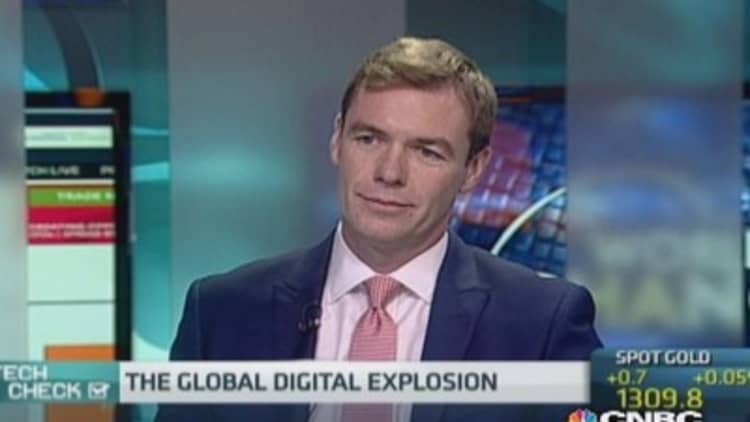The arrival of big data, it would appear, has bought with it an era of 'big brother' monitoring your every move based on the mass of information generated by mobile devices and the use of social media.
Just last month, the White House published its "Big Data" review in which it suggested updates to laws and measures to bolster privacy and prevent discrimination based on the data trail consumers leave on their phones and computers that are collected and analyzed by companies.
Read MoreBig data knows you're pregnant (and that's not all)
If big data brings about an Orwellian fear of a 'big brother,' perhaps there's a way to look at in more positive terms like a 'big sister' that looks out for you.
"Your level of engagement, interactions, elaborated in the big data clouds, is becoming useful back to you. It 'provides' for you like a 'big sister' would," said Nico Abbruzzese, global director of creative technology at Metalworks by Maxus, a media agency network based in Singapore.
"It's about augmentation. Big sister knows me and knows what I like and anticipates my needs by providing suggestions to make my life easier. That's great because we have far less time and far more choices to trawl through these days," he added.
Some examples of this in play are the recommendations for books or music based on previous purchases on websites such as Amazon.com.
In addition, there's also the growing use of wearable technology that takes the data you generate and gives you back information you might find useful such as how many calories you need to burn to stay in shape.
Read MoreWearable tech: It could save your life
"Big Data increases technology efficiencies that enable many useful new businesses to grow. Such as Uber for taxis, online car share schemes like Liftshare and music sites like Spotify. These make very little, if any use of 'personal data' – but are essential to make them work for you – such as location and musical taste," said Robert Webster, chief product officer, at global advertising technology firm Crimtan.
"Other useful new tools do require use of your personal data – such as personal health apps on cell phones, but you are asked if you want to provide this information. Ultimately, there has to be a fair exchange between the consumer and the technology cloud and you may need to give away something about yourself in exchange for a benefit," he said.
Fierce debate
Pros and cons aside, the use of big data has stoked a debate about the need to protect privacy.
"'Big data' is a fairly meaningless catch-all phrase which is being lazily overused," says William Eccleshare, the CEO of Clear Channel Outdoor, one of the world's biggest outdoor advertising firms.

"What is clear, though, is that over the next few years we will see a huge focus on how we allow information about ourselves to be used and not abused," he added. "We'll see growing consumer demands for their explicit permission to use personal data being actively sought before being given, with data capture used only for very specific purposes."'
In fact the "Big Data" review published by Washington in May was a response to the backlash following leaks by the former National Security Agency contractor Edward Snowden last year about the U.S. government's data collection programs.
It highlighted the social good that data collection and analysis can do – for instance in areas such as medical research. But the report also pointed out that the same techniques could be used to discriminate against consumers for housing or jobs.
And while data collection on consumers is not new, the volume and the nature of the data that is mined has changed because of the growth in internet and mobile device usage.
Read MoreHow big data has changed India elections
Data broker Acxiom claims that it has, on average, 1,500 pieces of information on more than 200 million Americans, Federal Trade Commissioner Julie Brill told CBS' 60 Minutes program in March.
"We need to understand that many 'helpful' uses of big data are, in fact, incursions into our privacy," said Adi Kamdar, an activist at the Electronic Frontier Foundation, a U.S.-based civil liberties organization set up in 1990 to tackle issues around the internet and civil rights.
"More and more companies, retailers, and website are using data brokers to tailor ads and products specifically to users. In return, though, these data firms put together detailed profiles about hundreds of millions of individuals, and most consumers do not know they even exist," he added.
Get smart
For some in the retail industry, the debate on big data should really be one about smart data.
Read MoreFighting tax fraudwith big data
"The conversation is not really about big data it's about smart data. There are a lot of people with an awful lot of data not knowing quite what to do with it," said Simon Hathaway, global president of RX at Cheil Worldwide, an agency that helped global retailer Tesco set up a virtual store in South Korea.
"As a result of that there's a potential sleeping giant that will work out how to best use that. That will be interesting," he added. "People have talked about retailers dying away but if they can get the data right, then they redefine what it is to be relevant in the market place today."
Eccleshare at Clear Channel Outdoor adds: "For us in the advertising industry, there is a fantastic opportunity to connect consumers with relevant and timely information and offers based on the data they choose to share. But the key word is 'choose'."


